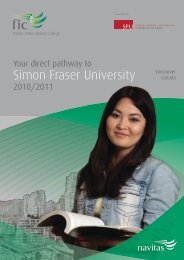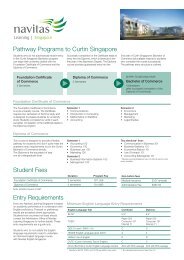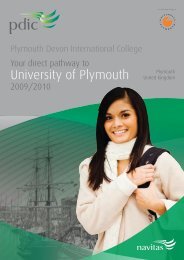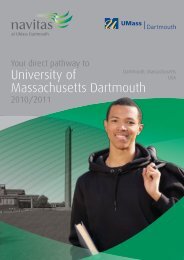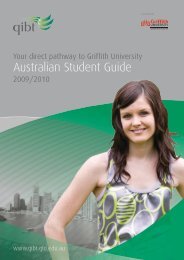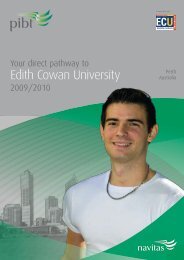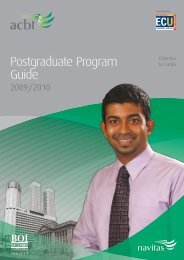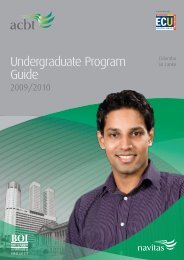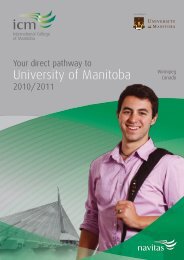Anglia Ruskin PG Prospectus - Navitas
Anglia Ruskin PG Prospectus - Navitas
Anglia Ruskin PG Prospectus - Navitas
You also want an ePaper? Increase the reach of your titles
YUMPU automatically turns print PDFs into web optimized ePapers that Google loves.
CambridgeTaught coursesMusic Therapy(MA)Length of courseFT 2 yearsStart dateSeptemberEntry requirements• Music Degree or equivalent (another degreebut with a high standard of musicianship).• High standard of flexible musicianshipdemonstrated by grade 8 or equivalent,and preferably one other instrument.• Relevant clinical experience with adultsand children (see further admissions criteriaavailable from Admissions Officer).• Relevant motivation, maturity and abilityto reflect on self in relation to others.• 23 years of age or over (this is a stateregistration requirement).FeesFind out how much your course will cost byvisiting our online course fees calculator atwww.anglia.ac.uk/coursefees or for moreinformation call one of our Contact CentreAdvisers on 0845 271 3333.For further informationCall our Contact Centre on 0845 271 3333or email: answers@anglia.ac.ukor visit: www.anglia.ac.ukHow to applyApplication details are available from ourContact Centre.The course provides aprofessional training in musictherapy with an emphasison clinical placements andan introduction to variousmusic therapy approaches.The course aims to trainsuitably experienced musiciansas professional music therapistsat masters-level, adhering tothe general clinical definitionof music therapy within the UK.From September 2006 the MA becomesthe qualification to practice and successfulcandidates will be eligible for registrationwith the Health Professions Council,which approved the new course followinga very successful visit in March 2006.Course contentThe current well-established diploma coursehas an excellent reputation, and is approvedby the Health Professions Council (HPC).The new MA will become the qualificationto practice and extend to two years.Two aspects of music therapy are centralto the music therapy approach in the UK.These are the use of improvised music andthe importance attached to the relationshipbetween the patient and the therapist.These elements, which result in the needfor rigorous clinical, musical, and psychologicaltraining on the music therapy course,underpin the training.<strong>Anglia</strong> <strong>Ruskin</strong> has a specific emphasis uponactive improvisation, experiential learning,and psychoanalytically informed practice,as well as developmental approaches.This clearly acknowledges that music therapyinvolves a relationship between patient andtherapist with music forming the basis forcommunication within this relationship.A video is available about the training coursefrom the Music Office. The training providesbackground in the study of child development,psychology, psychiatric disorders, theories,and related allied health professions.Musicianship training develops skills inimprovisation and voice production.Methods of teaching and learningThe course includes a high component ofexperiential learning and students are expectedto involve themselves in self-reflection, andsmall and large group activities. These involveboth musical activity and case discussion.Work takes place in large and small groupswith tutorials and supervision groups forminga central teaching style. There are also formallectures, seminars and field visits. A large sectionof the course is devoted to clinical placementsin a variety of community and hospital-basedsettings where students carry out their owncasework, supervised.AssessmentAssessment takes place against clear criteriaand learning outcomes which students areaware of and prepared for. Assessed activitiesrange from formal essay writing to experientiallearning, group learning, clinical improvisationand fieldwork, including clinical placements.Students are also assessed through self-analysisand reflection in discussions with theirPersonal Tutor.There is an assessment at the half-way pointwith one of the external examiners to considerthe student’s progress and process towardsbecoming a music therapist. The final oralassessment involves presenting in-depthcasework to two external examiners whoare active in the clinical field.Benefits to youThere is a new music therapy clinic at<strong>Anglia</strong> <strong>Ruskin</strong>. You will have the opportunityto gain extensive clinical experience both onplacement and within the clinic. Historically,the <strong>Anglia</strong> <strong>Ruskin</strong> Music Therapy training leads toa high percentage of students gaining jobs shortlyafter qualification (an average of 85% over nineyears). Our experienced staff are well knowninternationally for their publications, clinicalwork, research and teaching, and betweenthem cover all the major specialist areas.All the music therapist teachers on the coursealso hold clinical posts, so connections withthe workplace are strong.Students are ideally placed to gain from therichness of the University’s Department of Musicand Performing Arts and from our strong linkswith local clinical music therapy departments.The University also has a newly built MusicDepartment, within which some of the musictherapy teaching takes place. The Universityhas a wide range of facilities for studentssuch as learning and other support services,and computing and language facilities,all of which are readily available.Special featuresSuccessful completion of this course confersboth a diploma and an MA. The course offersintensive placements in established clinicalmusic therapy departments which include theopportunity to work with three cases over anextended period of time.There is an emphasis on experiential learningand you will gain experience of other artstherapies. The programme has stronginternational and research links.CareersCareer prospects are very positive andstudents can expect to find work easily, althoughinitially this may not be on a full-time basis.Music therapists are employed in the NHSwith adults and children with learning disabilitiesand mental health problems, and in theeducation sector with people with specialneeds. Increasingly, music therapists are beingemployed to work with children and adults inhospices and related outreach settings, andwith patients in medical settings. In the NHS,‘Agenda for Change’ has led to improved jobprospects and career paths, and music therapistsare employed at levels similar to, or higher than,those of other Allied Health Professionals.Some music therapists also work privatelyor on a freelance basis in a variety of settings.Links with industry or businessThere are strong international links throughstaff members, who are widely known fortheir publications and research profiles.This was commented on in the last ResearchAssessment Exercise. Visiting Professor TonyWigram is Head of Research and Professor atAalborg University, Denmark. We have stronglinks with this university and with others inEurope, Australia, and the USA.There are Erasmus links with Aalborg and withthe Ionian University in Corfu, as well as linkswith training courses in Spain, Finland, Italy,France, and other countries.66 Call our Contact Centre 0845 271 3333 for more informationweb www.anglia.ac.ukemail answers@anglia.ac.uk 67



